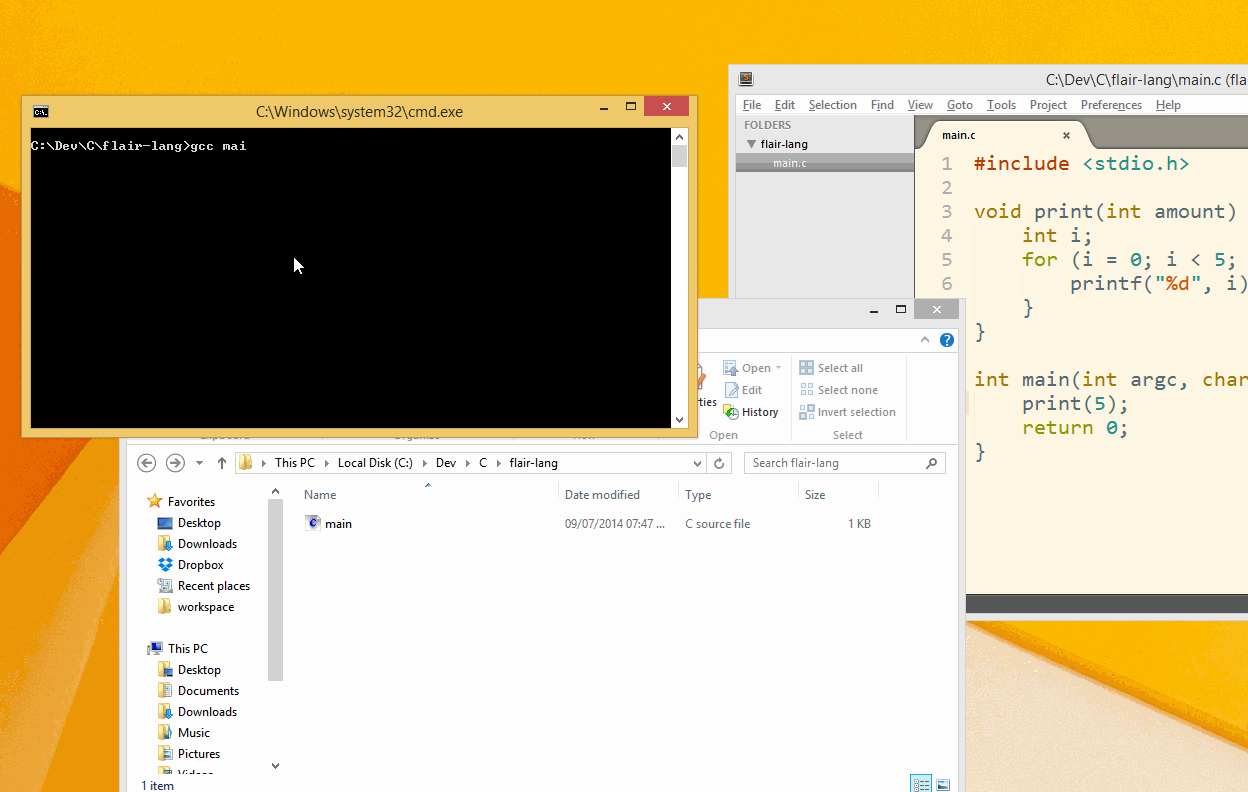gcc on Windows: generated "a.exe" file vanishes
Solution 1
(Since ahoffer's deleted answer isn't quite correct, I'll post this, based on information in the comments.)
On Windows, gcc generates an executable named a.exe by default. (On UNIX-like systems, the default name, for historical reasons, is a.out.) Normally you'd specify a name using the -o option.
Apparently the generated a.exe file generates a false positive match in your antivirus software, so the file is automatically deleted shortly after it's created. I see you've already contacted the developers of Avast about this false positive.
Note that antivirus programs typically check the contents of a file, not its name, so generating the file with a name other than a.exe won't help. Making some changes to the program might change the contents of the executable enough to avoid the problem, though.
You might try compiling a simple "hello, world" program to see if the same thing happens.
Thanks to Chrono Kitsune for linking to this relevant Mingw-users discussion in a comment.
This is not relevant to your problem, but you should print a newline ('\n') at the end of your program's output. It probably doesn't matter much in your Windows environment, but in general a program's standard output should (almost) always have a newline character at the end of its last line.
Solution 2
Try to compile with gcc but without all standard libraries using a command like this:
gcc -nostdlib -c test.c -o test.o; gcc test.o -lgcc -o test.exe
One of the mingw libraries binary must generate a false positive, knowing which library would be useful.
Solution 3
There is no issue with your code it is just exiting properly.
You have to run it in the command line which will show you all the info.
start->run->cmd, then cd to your directory. then a.exe. If you don't want to do that you can add a sleep() before the return in main.
More over, in your code when you pass print(5) to your function it's not being used.
chapman
Updated on June 15, 2022Comments
-
chapman almost 2 years
I'm using GCC version 4.7.1, but I've also tried this on GCC 4.8. Here is the code I'm trying to compile:
#include <stdio.h> void print(int amount) { int i; for (i = 0; i < 5; i++) { printf("%d", i); } } int main(int argc, char** argv) { print(5); return 0; }It looks like it should work, and when I compile with...
gcc main.cIt takes a while to compile, produces an
a.exefile and the thea.exefile disappears. It isn't giving me any errors with my code.Here's a gif of proof, as some people are misinterpreting this:

-
 Raydel Miranda almost 10 yearsHave you some antivirus installed? Try disabling it and let us know.
Raydel Miranda almost 10 yearsHave you some antivirus installed? Try disabling it and let us know. -
chapman almost 10 yearsMoved it to my desktop and tried compiling it there, same result again
-
chapman almost 10 yearsThe third window is Sublime Text 3
-
 n. m. almost 10 yearsOK, a terminological train wreck. gcc probably has nothing to do with this. Look at your system logs and antivirus logs.
n. m. almost 10 yearsOK, a terminological train wreck. gcc probably has nothing to do with this. Look at your system logs and antivirus logs. -
chapman almost 10 years@RaydelMiranda Spot on, strange since it will usually warn me if it quarantines or flags a file. I'm using Avast Antivirus, if that helps.
-
chapman almost 10 yearsNow I just need to figure out how to stop avast from blacklisting my code :(
-
Keith Thompson almost 10 yearsActually ahoffer's deleted answer isn't quite correct; it suggests that the file name
a.exeis the problem. In fact virus scanners check the contents of files, not their names. (In this case, it's a false positive.) -
 Gilles 'SO- stop being evil' almost 10 years@KeithThompson Some malware scanners do delete files based on their names (more as a simple-minded way of making it hard to install software not approved by central IT than as a way to remove actual malware).
Gilles 'SO- stop being evil' almost 10 years@KeithThompson Some malware scanners do delete files based on their names (more as a simple-minded way of making it hard to install software not approved by central IT than as a way to remove actual malware).
-
-
chapman almost 10 yearsWhile I was attempting to solve the solution, I changed the for loop to loop from 0 to 5 rather than 0, to amount. Also I am running it in the command line. And I can't run a.exe if it's not there.
-
Scotty Bauer almost 10 yearsI see I mis-read your question. It says a.exe is disappearing, not the terminal window. My apologies.
-
chapman almost 10 yearsI tried redFives suggestion and it didn't work. Also my antivirus would notify me if it were to quarantine a file.
-
chapman almost 10 yearsAhh, that makes sense :)
-
chapman almost 10 yearsI think you're onto something though, since I printed some text after calling the
print(int)function, and it executes fine. Any ideas? -
Scotty Bauer almost 10 yearstry adding -O0 flag and see if that does anything. GCC could be optimizing everything out for some ungodly reason.
-
chapman almost 10 yearsSame result, again :(
-
Scotty Bauer almost 10 yearsTry adding a \n after the %d to force a flush on stdout
-
chapman almost 10 yearsTried that, same result still.
-
 aliteralmind almost 10 yearsIt is customary to provide commentary along with your "code".
aliteralmind almost 10 yearsIt is customary to provide commentary along with your "code". -
Slovakov about 4 yearsI've faced the same problem and compiling my file this way helped. Any idea about how could I narrow down which library is causing a problem?
-
General Grievance almost 4 yearsSo... your solution is to turn off the thing protecting the computer?